Related Research Articles
Ukrainian music covers diverse and multiple component elements of the music that is found in the Western and Eastern musical civilization. It also has a very strong indigenous Slavic and Christian uniqueness whose elements were used among the areas that surround modern Ukraine.
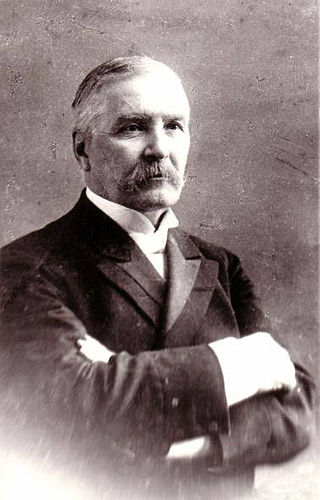
Mykola Vitaliyovych Lysenko was a Ukrainian composer, pianist, conductor and ethnomusicologist of the late Romantic period. In his time he was the central figure of Ukrainian music, with an oeuvre that includes operas, art songs, choral works, orchestral and chamber pieces, and a wide variety of solo piano music. He is often credited with founding a national music tradition during the Ukrainian national revival, in the vein of contemporaries such as Grieg in Norway, The Five in Russia as well as Smetana and Dvořák in what is now the Czech Republic.
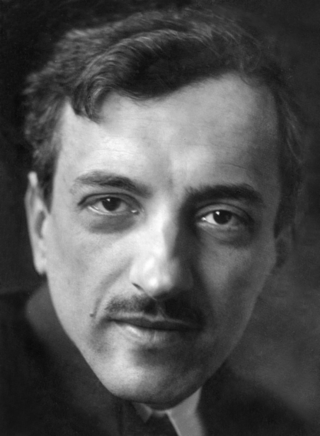
Borys Mykolaiovych Lyatoshynsky ), also known as Boris Nikolayevich Lyatoshinsky, was a Ukrainian composer, conductor, and teacher. A leading member of the new generation of 20th century Ukrainian composers, he was awarded a number of accolades, including the honorary title of People's Artist of the Ukrainian SSR and two Stalin Prizes.
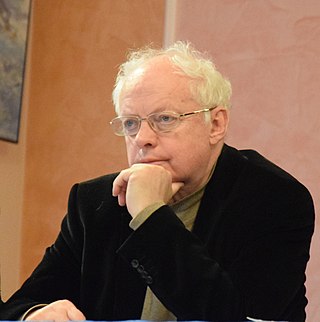
Myroslav Mykhailovych Skoryk was a Ukrainian composer and teacher. His music is contemporary in style and contains stylistic traits from Ukrainian folk music traditions.
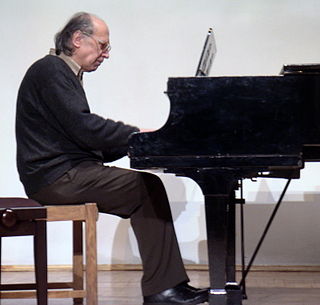
Valentyn Vasylyovych Sylvestrov is a Ukrainian composer and pianist, who plays and writes contemporary classical music.

Artemy Lukyanovich Vedel, born Artemy Lukyanovich Vedelsky, was an Ukrainian-born Russian composer of military and liturgical music. He produced works based on Ukrainian folk melodies, and made an important contribution in the music history of Ukraine. Together with Maxim Berezovsky and Dmitry Bortniansky, Vedel is recognised by musicologists as one of the "Golden Three" composers of 18th century Ukrainian classical music, and one of Russia's greatest choral composers.

Volodymyr Mikolayovich Sosiura was a Ukrainian lyric poet, writer, veteran of the Russian Civil War (1918–1920).
Boris Aleksandrovich Arapov was a Soviet and Russian composer. People's Artist of the RSFSR (1976).
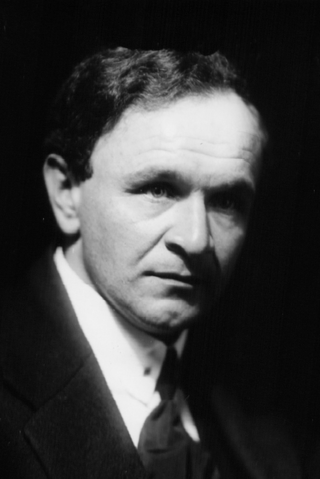
Viktor Stepanovych Kosenko was a Ukrainian composer, pianist, and educator. He was regarded by his contemporaries as a master of lyricism.

Dmitry Borisovich Kabalevsky was a Soviet composer, conductor, pianist and pedagogue of Russian gentry descent.

Stefania Turkewich-Lukianovych, also spelled Turkevycz and Turkevich, was a Ukrainian composer, pianist, and musicologist. She is recognized as Ukraine's first woman composer. In the USSR, her works were banned by the state authorities.
Maria Semyonovna Zavalishina was a Soviet composer and teacher.
Ludmila Anatolievna Yaroshevskaya was a Soviet composer, pianist, and concertmistress. A native of Kyiv, she studied piano with V. Pukhalsky at the Lysenko Music School there, graduating in 1930. She was concertmistress at the Lviv Music School from 1923 to 1926. She died in Lviv in 1975.
Ellen Florence Williams Whitlock was a British composer, conductor and educator who was known professionally as E. Florence Whitlock.
Svea Goeta Nordblad Welander was a Swedish composer, organist, teacher, and violist, who was born in Linhamm, Malmo, to a family of nine children. In 1914, she began working as cinema pianist to save money for further education. She studied in Malmo and later in Copenhagen. Her teachers included John Heinze, Henrik Knudsen, Lars-Erik Larsson, and Sten Broman. She became a member of the Society of Swedish Composers.
Lyubov Lvovna Streicher was a Russian composer, teacher, and violinist, as well as a founding member of the Society for Jewish Folk Music.
Mirjana Sistek-Djordjevic is a Serbian composer who was born in Belgrade. She was one of the first Serbian women composers to earn a Doctor of Musical Arts (DMA) degree.
Tamara Stepanovna Maliukova Sidorenko was a Ukrainian composer, music educator and pianist.
Jeanne Louise Hillemacher Servier (1807-1858) was a French composer who published most of her work under the name Mme.H. Servier. Her best known work was Methode Elementaire et Progressive de Chant a l’Usage de Toutes les Voix.
References
- 1 2 3 4 5 6 7 8 9 10 "Rozhavska Yudif Hryhorivna - Ukrainian Musical World" . Retrieved 2023-12-31.
- 1 2 3 4 5 6 Cohen, Aaron I. (1987). International Encyclopedia of Women Composers. Books & Music (USA). p. 603. ISBN 978-0-313-24272-4.
- 1 2 3 4 Ho, Allan Benedict; Feofanov, Dmitry (1989). Biographical dictionary of Russian/Soviet composers. New York: Greenwood Press. ISBN 978-0-313-24485-8.
- ↑ Stewart-Green, Miriam (1980). Women composers: A checklist of works for the solo voice. A reference publication in women's studies. Boston, Mass: Hall. p. 62. ISBN 978-0-8161-8498-9.
- 1 2 3 4 "Yudif Rozhavskaya". Kinorium. Retrieved 2023-12-31.
- ↑ Richmond, Sonya (1985). A Musical Journey Through the Soviet Union. Progress Publishers. p. 91.
- ↑ McVicker, Mary F. (2016-08-04). Women Opera Composers: Biographies from the 1500s to the 21st Century. McFarland. p. 212. ISBN 978-1-4766-2361-0.